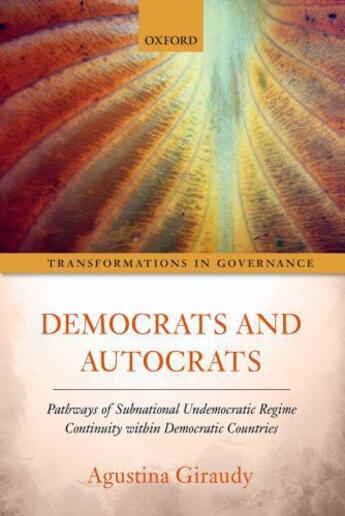-
Nombre de pages : (-)
-
Collection :
(-)
-
Genre :
(-)
-
Thème :
Non attribué
-
Prix littéraire(s) :
(-)
Résumé:
Despite the fact that countries transitioned to democracy, many citizens residing in peripheral regions continue to live under undemocratic rule. Democrats and Autocrats studies the existence of subnational undemocratic regimes (SURs) alongside national democratic regimes in Latin America. The... Voir plus
Despite the fact that countries transitioned to democracy, many citizens residing in peripheral regions continue to live under undemocratic rule. Democrats and Autocrats studies the existence of subnational undemocratic regimes (SURs) alongside national democratic regimes in Latin America. The book fundamentally challenges the assumption that there is one single pathway to subnational undemocratic regime (SUR) continuity within countries. It shows instead the existence of multiple, within-country, pathways that lead to SUR continuity. The study is premised on the notion that SURs within countries not only differ among each other but that they maintain different relations with the federal government, which is why they are reproduced differently. Using a multi-method approach, Democrats and Autocrats shows that, within-country, alternative trajectories of SUR continuity in Argentina and Mexico result first and foremost from the capacity (or lack thereof) of national incumbents to wield power over SURs and subnational autocrats.
Contrary to conventional wisdom, the book argues that there are multiple pathways for SURs reproduction within democratic countries. These pathways, in turn, are determined by a specific combination of intergovernmental interactions, all of which are shaped by institutional and economic national and subnational variables.
The explanation of SUR continuity advanced in this book is tested in contemporary Argentina and Mexico using a multi-method approach. Both quantitative and qualitative methods, as well as cross-national and within-country comparisons are employed to test pathways of SUR continuity in two of Latin America's largest countries.
Transformations in Governance is a major new academic book series from Oxford University Press. It is designed to accommodate the impressive growth of research in comparative politics, international relations, public policy, federalism, environmental and urban studies concerned with the dispersion of authority from central states up to supranational institutions, down to subnational governments, and side-ways to public-private networks. It brings together work that significantly advances our understanding of the organization, causes, and consequences of multilevel and complex governance. The series is selective, containing annually a small number of books of exceptionally high quality by leading and emerging scholars.
The series targets mainly single-authored or co-authored work, but it is pluralistic in terms of disciplinary specialization, research design, method, and geographical scope. Case studies as well as comparative studies, historical as well as contemporary studies, and studies with a national, regional, or international focus are all central to its aims. Authors use qualitative, quantitative, formal modeling, or mixed methods. A trade mark of the books is that they combine scholarly rigour with readable prose and an attractive production style.
The series is edited by Liesbet Hooghe and Gary Marks of the University of North Carolina, Chapel Hill, and the VU Amsterdam, and Walter Mattli of the University of Oxford.
Donner votre avis














